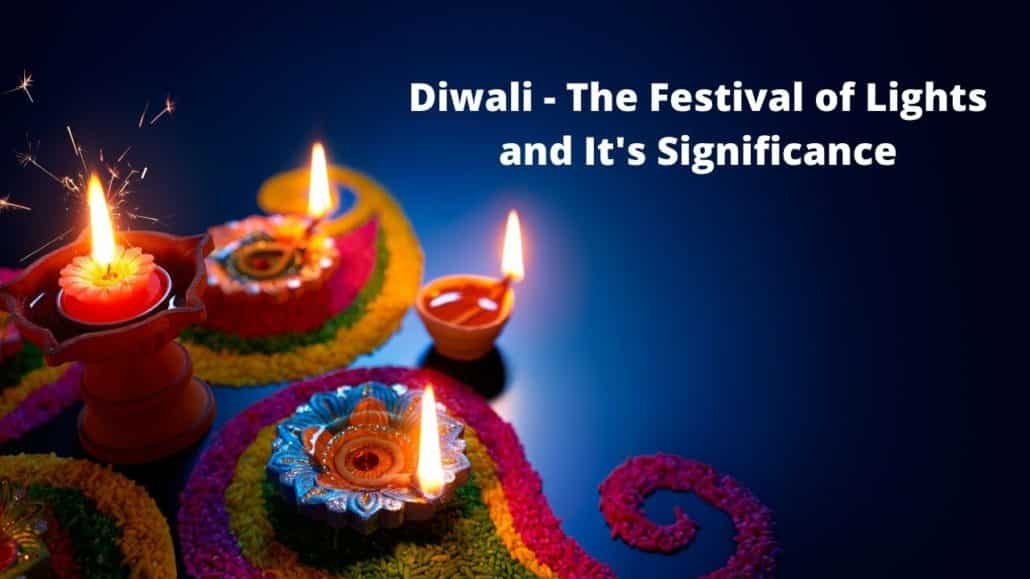Diwali is the festival of lights celebrated across the whole country. The festival of lights is celebrated in the Kartik Masam which usually lasts five days, starting from Dhanteras(The Gold Buying day), followed by Narak Chaturdashi (Chhoti Diwali), Lakshmi Pujan (Badi Diwali), Govardhan Puja, and Bhai Dooj.
Deepawali originates from Sanskrit words deep (lamp) and vali (row). This literally means “row of lights”. Deepawali festival is celebrated by lighting earthen lamps.
Even though Diwali is mainly considered a Hindu festival, this day marks different events in different communities. Everywhere, Diwali symbolizes the spiritual “victory of light over darkness, good over evil, and knowledge.
Deepawali is also Amāvásyā(The lunar phase of the New moon in Sanskrit.) We know that the new moon means darkness and Diwali is celebrated as the win over darkness. Here are many different reasons Diwali is celebrated in India:
Rama’s return to Ayodhya after Ravana’s defeat :
We already know that Rama had killed Ravana on the day Dussehra is celebrated and is returning back to his homeland(Ayodhya) to take the throne back. That auspicious day is Diwali.
Pandava’s return to Hastinapur:
The five Pandava brothers had been tricked into losing a bet in gambling after which their Kaurava cousins banished them for 12 years. The Pandavas returned to Hastinapur on Kartik Amavasya, as per the Hindu epic Mahabharata.
Krishna killed Narakasura:
In Dwapara yuga, Lord Krishna, an avatar of Lord Vishnu, killed the demon Narakasura, Evil king of Pragjyotishapura, near present-day Assam, who had held 16,000 girls in captivity. In the Braj region in northern India, parts of Assam, as well as southern Tamil and Telugu communities, Narak Chaturdashi is viewed as the day on which Krishna killed Narakasura.
Goddess Lakshmi’s birth :
As per another popular tradition, Diwali is also celebrated as the day Goddess Lakshmi was born from Samudra Amntham,
the churning of the cosmic ocean of milk by the gods and demons. On the night of Diwali, Lakshmi chose Vishnu as her husband and
married him.
Vishnu rescued Lakshmi :
It is believed that Lord Vishnu(husband of goddess Lakshmi), in his fifth Vaman-avatar, rescued Goddess Lakshmi from the prison of King Bali. On this day, King Bali was banished to rule the netherworld on the order of Lord Vishnu.
Bandi Chhor Diwas :
In Sikhism, Diwali is related to a historic event. Guru Hargobind, the sixth Sikh Guru, along with 52 other Hindu kings,
was released from captivity by Mughal emperor Jahangir on the day of Diwali.
Mahavira Nirvana Diwas:
In Jainism, the festival of Diwali is celebrated to observe the anniversary of Nirvana of Mahavira’s soul, the twenty-fourth and last Jain Tirthankara of the present cosmic age. Mahavira attained moksha (liberation) on Chaturdashi of Kartik month.
Maharshi Dayananda attained Nirvana:
On the new moon day of Kartik, Maharshi Dayananda, founder of Arya Samaj, attained Nirvana.
Maharaja Vikramaditya’s coronation:
Legendary Hindu king Vikramaditya was crowned on Diwali. He is characterized as an ideal king known for his generosity, courage and patronage of scholars.
Kali Puja:
As per the Kalikula sect of Shaktism, the day of incarnation of Kamalatmika, the last manifestation of goddess Mahakali, is celebrated as Kamalatmika Jayanti. It falls on the day of Deepawali. Kali Puja is celebrated in regions of Bengal, Mithila, Odisha, Assam, Sylhet, Chittagong and the town of Titwala in Maharashtra.
End of harvest season:
According to another popular belief, Deepawali may have originated as a harvest festival, marking the last harvest of the year before winter.
Diwali as New Year:
In western states such as Gujarat and some northern Hindu communities of India, the festival of Diwali signifies the start of a new year.
So, These are the different reasons why Diwali is celebrated in India according to their own traditions in their own ways.
Team CrunchStories wishes you and your family A Very Happy Diwali. May goddess Lakshmi also be with you.
